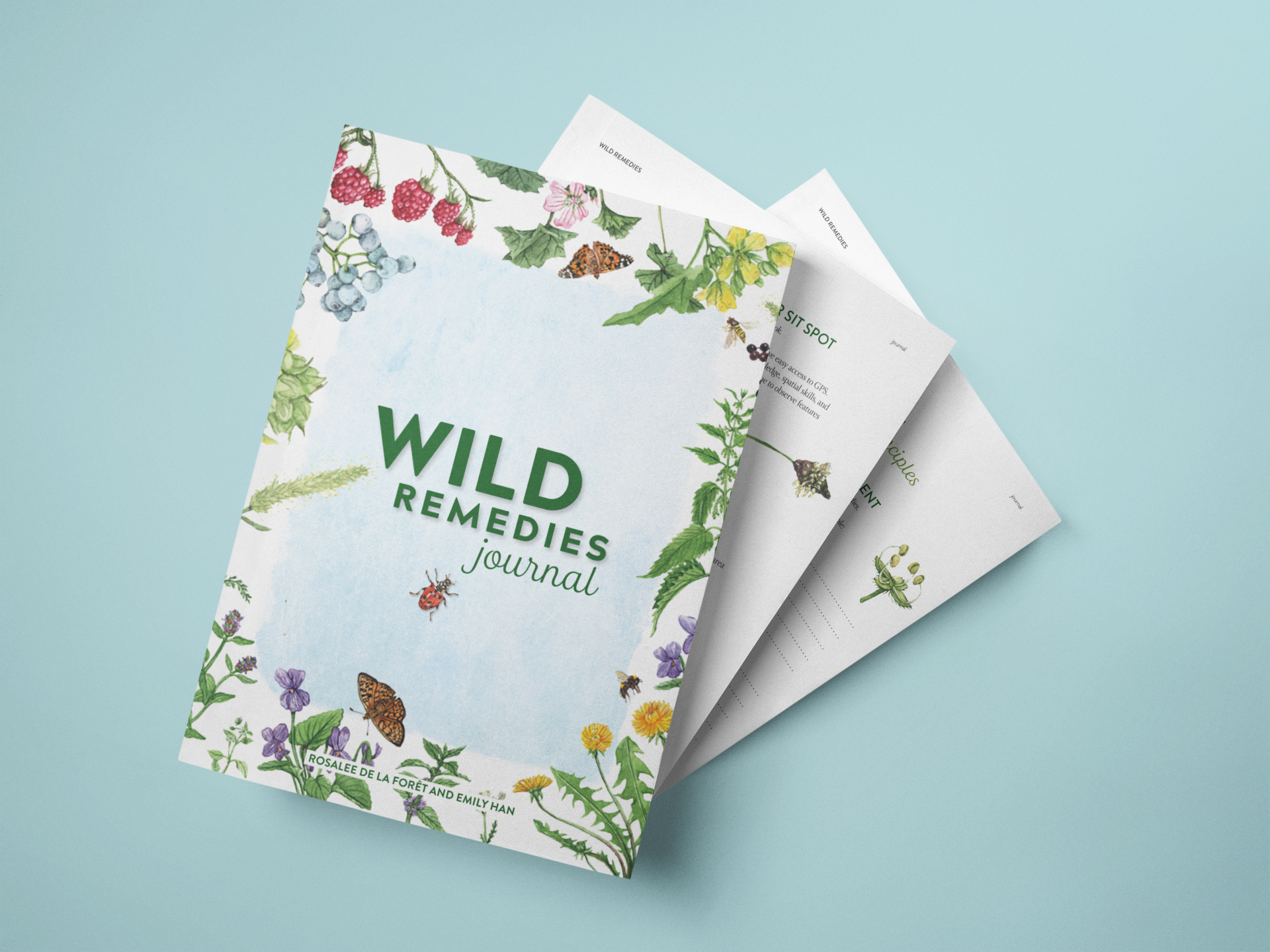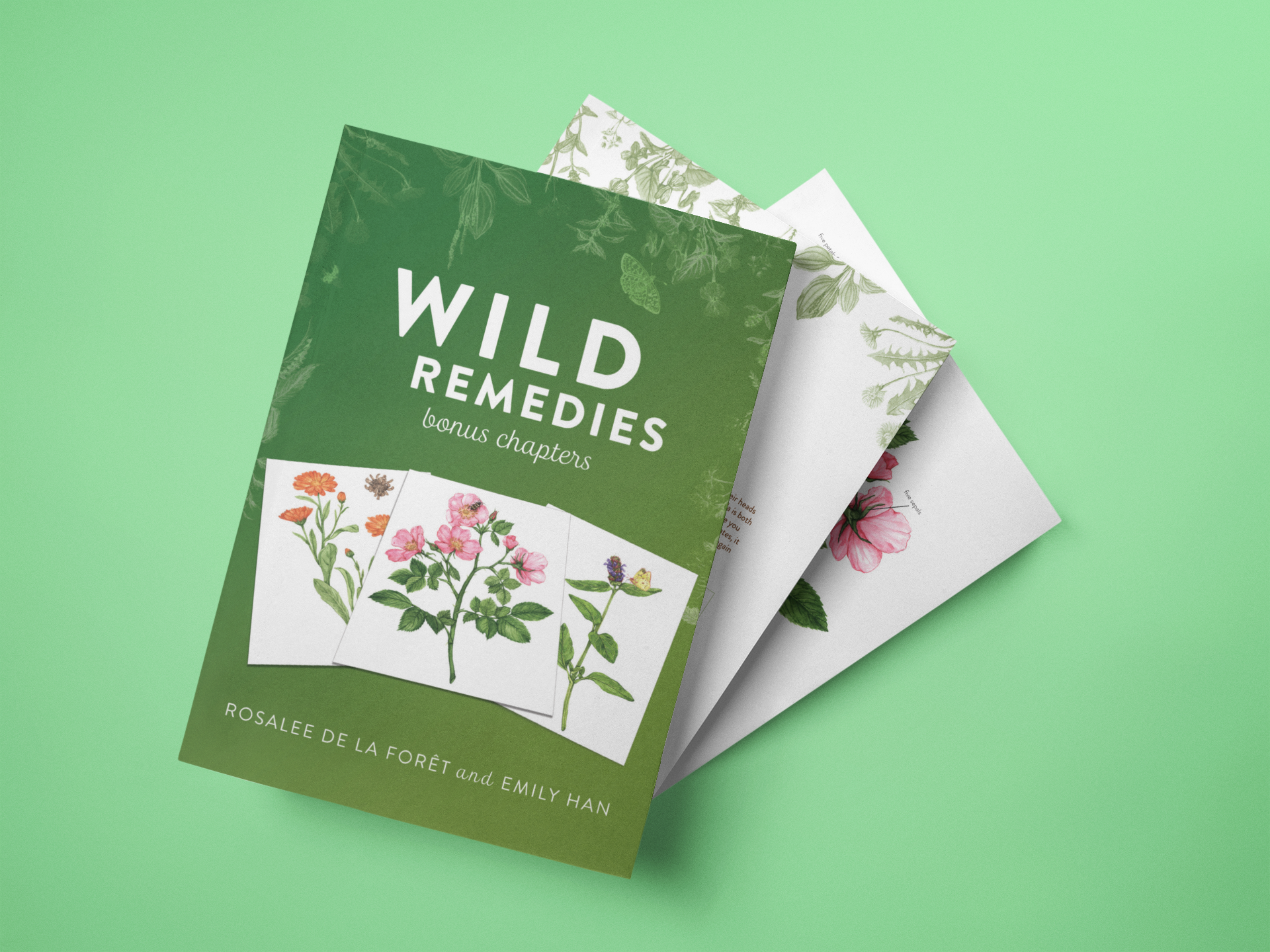
WILD REMEDIES JOURNAL
A companion journal for the prompts and exercises in the Wild Remedies book.

BONUS CHAPTERS
Get 3 bonus chapters plus updates and exclusive gifts from Rosalee and Emily.
RECOMMENDED RESOURCES
The best places to find herbs and other supplies are local grassroots herbalists, apothecaries, and plant nurseries or even small farms. If you aren’t able to find something locally, we recommend the following resources.
HERBS, SPICES, AND RAW INGREDIENTS
- Mountain Rose Herbs
- Pacific Botanicals
- Zack Woods Herb Farm
- Frontier Co-op
- Sustainable Herb Farms and Ethical Wildcrafters in the USA and Canada
SEEDS AND PLANTS
TOOLS AND SUPPLIES
- Mountain Rose Herbs: containers and kitchen tools
- Specialty Bottle: bottles and jars
- Fillmore Container: bottles and jars
- GrowOrganic.com: harvesting and gardening tools
BOOKS
- De la Forêt, Rosalee. Alchemy of Herbs: Transform Everyday Ingredients into Foods and Remedies That Heal (Hay House, 2017).
- Han, Emily. Wild Drinks and Cocktails: Handcrafted Squashes, Shrubs, Switchels, Tonics, and Infusions to Mix at Home (Fair Winds Press, 2015).
- Brill, “Wildman” Steve. Identifying and Harvesting Edible and Medicinal Plants in Wild (and Not So Wild) Places (William Morrow, 1994); additional titles available at wildmanstevebrill.com.
- Cech, Richo. The Medicinal Herb Grower: A Guide for Cultivating Plants that Heal (Horizon Herbs, 2009).
- Elpel, Thomas J. Botany in a Day: The Patterns Method of Plant Identification (Hops Press, 2013).
- Falconi, Dina. Foraging and Feasting: A Field Guide and Wild Food Cookbook (Botanical Arts Press, 2013).
- Green, James. The Herbal Medicine-Maker’s Handbook: A Home Manual (Crossing Press, 2000).
- Herbalists Without Borders. Start a Nourishing Community Garden (Herbalists Without Borders, 2018); eguide available at www.hwbglobal.org.
- Kimmerer, Robin Wall. Braiding Sweetgrass: Indigenous Wisdom, Scientific Knowledge, and the Teachings of Plants (Milkweed Editions, 2013).
- Klehm, Nance, et al. The Ground Rules: A Manual to Reconnect Soil and Soul (Social Ecologies, 2015); available at https://halfletterpress.com/the-ground-rules-a-manual-to-reconnect-soil-and-soul/.
- Peterson Field Guides, including A Field Guide to Medicinal Plants and Herbs of Eastern and Central North America by Steven Foster and James A. Duke (Houghton Mifflin Harcourt, 2014) and A Field Guide to Western Medicinal Plants and Herbs by Steven Foster and Christopher Hobbs (Houghton Mifflin Harcourt, 2002).
- Sherman, Sean and Beth Dooley. The Sioux Chef’s Indigenous Kitchen (University of Minnesota Press, 2017).
- Thayer, Samuel. The Forager’s Harvest: A Guide to Identifying, Harvesting, and Preparing Edible Wild Plants (Forager’s Harvest, 2006) and Nature’s Garden: A Guide to Identifying, Harvesting, and Preparing Wild Edible Plants (Forager’s Harvest, 2010).
- Timber Press’s regional foraging books, including Midwest Medicinal Plants by Lisa M. Rose (2017), Mountain States Medicinal Plants by Briana Wiles (2018), Pacific Northwest Medicinal Plants by Scott Kloos (2017), California Foraging by Judith Larner Lowry (2014), Midwest Foraging by Lisa M. Rose (2015), Mountain States Foraging by Briana Wiles (2016), Northeast Foraging by Leda Meredith (2014), Pacific Northwest Foraging by Douglas Deur (2014), Southeast Foraging by Chris Bennett (2015), and Southwest Foraging by John Slattery (2016).
- Viljoen, Marie. Forage, Harvest, Feast: A Wild-Inspired Cuisine (Chelsea Green, 2018).
WEBSITES
- Rosalee de la Forêt’s website: Get more herbal tips and insights from Rosalee, including recipes, monographs, and more.
- Emily Han’s website: Get recipes, learn about Emily’s classes and events, and more.
- LearningHerbs: Turn plants into herbal remedies that heal. The LearningHerbs blog is filled with easy recipes you can make at home.
- American Herbalists Guild: This association of herbal practitioners offers free trainings and hosts an annual symposium.
- Botany Everyday: A wonderful resource for herbalists interested in learning more about plant identification.
- Cooperative Extension Services: Each US state has a network of universities and offices that provide useful information about agriculture, food, the environment, and more. Local programs may include Master Gardeners, Master Naturalists, and Master Food Preservers, as well as soil-testing services.
- Diversify Outdoors: Promotes diversity in outdoor spaces where people of color, LGBTQIA, and other diverse identities have historically been underrepresented.
- Earthseed Detroit: Strives to contribute to a participatory health and wellness model that is rooted in natural and local food sources, plant based medicine, and therapeutic agriculture in Detroit and beyond.
- Food Swap Network: Find or start a food swap in your area!
- Herbalista: An Atlanta-based organization that sponsors health services and herbal education through a variety of programs, empowering folks to care for themselves and their neighbors.
- Herbstalk: A grassroots, Boston-area group passionate about connecting people with plants and creating ways for herbal knowledge to be shared with a wider audience.
- HerbRally: An online resource with calendar listings for herbal events, monographs, and an herbal podcast.
- How to Prune Trees: This free USDA publication covers how, when, and why to prune trees.
- iNaturalist: Helps you identify the plants and animals around you. Get connected with a community of over 750,000 scientists and naturalists.
- Latino Outdoors: Inspires, connects, and engages Latino communities in the outdoors and embraces cultura y familia as part of the outdoor narrative.
- Lexi Koch: Lexi generously offers a free audio meditation, a guided journey to connect with your inner voice.
- Native Plant Network Propagation Protocols: Devoted to the sharing of information on how to propagate native plants of North America (US, Canada, Mexico, and the Pacific Islands).
- Native Womens Wilderness: Brings Native women together to share their stories, support each other, and learn from one another as they explore and celebrate the wilderness and their native lands.
- Outdoor Afro: A cutting edge network that celebrates and inspires African American connections and leadership in nature.
- Pride Outside: An organization that works to promote opportunities outdoors for the LGBTQ community.
- Social Ecologies: Engages local residents in building healthy habitats and spreading holistic, systematic thinking by creating and maintaining collaborative long-term interactive neighborhood projects.
- Sustainable Herbs Program: Inspires and educates people about quality, sustainability, and fair trade in the botanical industry.
- United Plant Savers: United Plant Savers’ mission is to protect native medicinal plants (and their habitat) of the United States and Canada, while ensuring an abundant renewable supply of plants for generations to come.
- USDA Plant Hardiness Zone Map: This map is the standard by which gardeners and growers can determine which plants are most likely to thrive at a location.
- USDA PLANTS Database: This site provides standardized data about all the plant species, both native and exotic, found in the United States and its territories.

